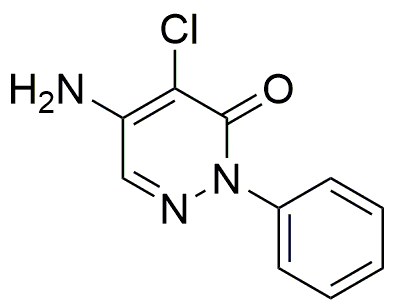Chloridazon is widely utilized in research focused on:
- Agricultural Herbicide: It is primarily used to control broadleaf weeds and grasses in various crops, enhancing agricultural productivity and crop yield.
- Soil Health Improvement: By effectively managing weed populations, it helps maintain soil health and reduces competition for nutrients, allowing crops to thrive.
- Research in Plant Physiology: Scientists use chloridazon to study plant responses to herbicides, contributing to the development of more sustainable weed management practices.
- Environmental Impact Studies: Its application in research helps assess the environmental effects of herbicides, aiding in the formulation of safer agricultural practices.
- Development of New Formulations: The chemical serves as a basis for developing advanced herbicide formulations that offer improved efficacy and reduced environmental impact compared to older compounds.
General Information
Properties
Safety and Regulations
Applications
Chloridazon is widely utilized in research focused on:
- Agricultural Herbicide: It is primarily used to control broadleaf weeds and grasses in various crops, enhancing agricultural productivity and crop yield.
- Soil Health Improvement: By effectively managing weed populations, it helps maintain soil health and reduces competition for nutrients, allowing crops to thrive.
- Research in Plant Physiology: Scientists use chloridazon to study plant responses to herbicides, contributing to the development of more sustainable weed management practices.
- Environmental Impact Studies: Its application in research helps assess the environmental effects of herbicides, aiding in the formulation of safer agricultural practices.
- Development of New Formulations: The chemical serves as a basis for developing advanced herbicide formulations that offer improved efficacy and reduced environmental impact compared to older compounds.
Documents
Safety Data Sheets (SDS)
The SDS provides comprehensive safety information on handling, storage, and disposal of the product.
Product Specification (PS)
The PS provides a comprehensive breakdown of the product’s properties, including chemical composition, physical state, purity, and storage requirements. It also details acceptable quality ranges and the product's intended applications.
Certificates of Analysis (COA)
Search for Certificates of Analysis (COA) by entering the products Lot Number. Lot and Batch Numbers can be found on a product’s label following the words ‘Lot’ or ‘Batch’.
Numéro de catalogue
Numéro de lot/série
Certificates Of Origin (COO)
This COO confirms the country where the product was manufactured, and also details the materials and components used in it and whether it is derived from natural, synthetic, or other specific sources. This certificate may be required for customs, trade, and regulatory compliance.
Numéro de catalogue
Numéro de lot/série
Safety Data Sheets (SDS)
The SDS provides comprehensive safety information on handling, storage, and disposal of the product.
DownloadProduct Specification (PS)
The PS provides a comprehensive breakdown of the product’s properties, including chemical composition, physical state, purity, and storage requirements. It also details acceptable quality ranges and the product's intended applications.
DownloadCertificates of Analysis (COA)
Search for Certificates of Analysis (COA) by entering the products Lot Number. Lot and Batch Numbers can be found on a product’s label following the words ‘Lot’ or ‘Batch’.
Numéro de catalogue
Numéro de lot/série
Certificates Of Origin (COO)
This COO confirms the country where the product was manufactured, and also details the materials and components used in it and whether it is derived from natural, synthetic, or other specific sources. This certificate may be required for customs, trade, and regulatory compliance.


